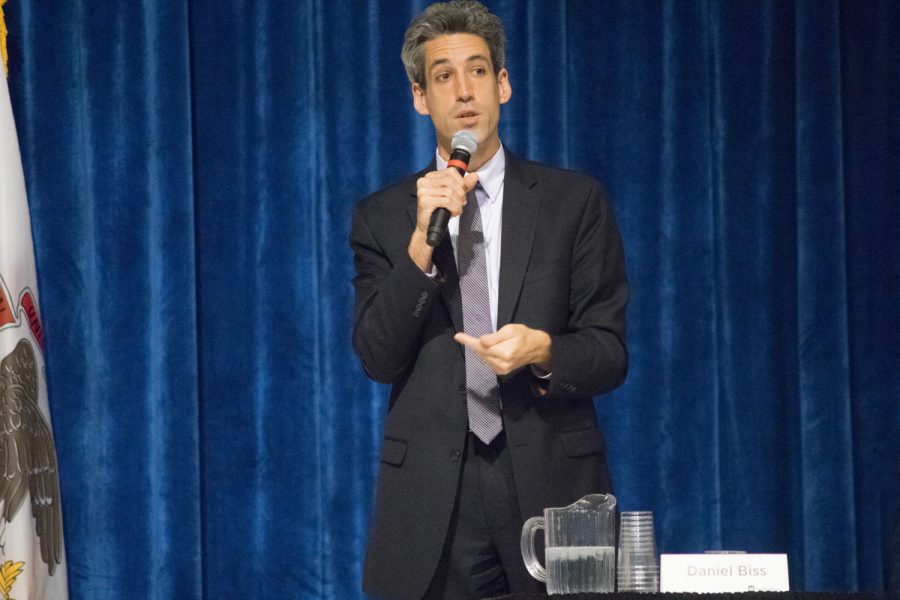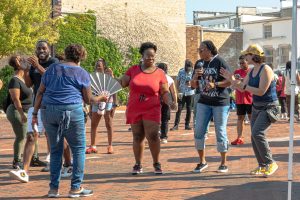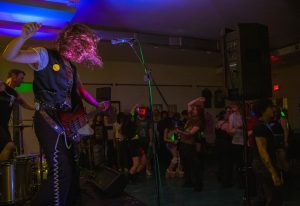Gubernatorial forum comes to campus; candidates discuss Rauner and income tax
October 5, 2017
DeKALB — NIU Forensics hosted a debate between five democratic gubernatorial candidates Tuesday, which garnered a crowd of about 170 NIU and local community members.
Participants in the debate were Democratic gubernatorial candidates Daniel Biss, Bob Daiber, Tio Hardiman, Chris Kennedy and Alex Paterakis. Democratic gubernatorial candidates JB Pritzker, Ameya Pawar and Robert Marshall were unable to attend. The debate was moderated by Susan Stephens, WNIJ news reporter and producer.
Opening statements from each candidate consisted of attacks on Gov. Bruce Rauner and a focus on the future; each candidate spoke of their “progressive” ideas.
The first Rauner shot of the night came from State Sen. Biss (D-Evanston).
“We have a governor in Bruce Rauner who has burned the state down and locked the rest of us out,” Biss said.
Paterakis, a 29-year-old civil engineer and small business owner, joined in.
“Who’s ready to get rid of the most ineffective governor; the only one not in jail?” Paterakis said.
The Rauner shots were constant through the night, as were discussions of a progressive tax.
A progressive income tax would mean a higher percentage of one’s income would be withdrawn for state taxes based upon one’s annual income. Illinois currently has a flat tax rate, which means all residents, no matter their income, pay the same amount. This can only be abolished via amendment to the state constitution.
“The most important thing is the progressive tax, which is proven to bring in $2 billion in new revenue for the state of Illinois,” said Hardiman, a repeat candidate from the 2014 election and executive director for non-violence group Violence Interrupters.
Daiber, a former educator and regional superintendent of schools in Madison County, said he does not see a progressive income tax as a quick fix.
“The first thing that I will do is ask for a bonding bill to bond out the $14.5 billion in unpaid bills,” Daiber said.
Kennedy said he hopes to fix the state economy along with the budget. State legislators failed to pass a full budget for Fiscal Years 2016 and 2017, resulting in a lack of appropriations for state-funded institutions and programs. However, lawmakers passed a budget for FY18 in June.
“You can’t fix the state economy if all you’re worried about is the budget,” said Kennedy, former University of Illinois Board of Trustees chairperson. “The economy is in turmoil here. Today, the jobs move to where the kids are. That’s why a place like Northern is essential.”
Biss said he wants state tax loopholes to be closed; throughout the debate, he frequently brought up the state’s “broken tax code,” along with the loopholes being exploited by hedge fund managers.
“If we have the guts to set up a tax code that works… for the 2017 economy, our resources are there,” Biss said. “A tiny tax could bring in billions of dollars of revenue.”
Outside of bringing in a progressive income tax, the candidates discussed other ways to improve the Illinois economy.
“Communities have to be willing to step up and invest in infrastructure,” Daiber said. “And we have to have a readily trained, skilled workforce.”
Kennedy said he believes improvements in higher education will lead to improvements in the state economy.
“We need to provide highly educated kids at the high school and college level,” Kennedy said. “If we commit to being the best educated state in the nation, we will have the best economy in the nation.”
Candidates also discussed the expansion of mental health services across the state.
“We don’t do enough to rehab people coming out of jail,” Paterakis said. “We don’t do enough for our veterans. We see tragedies like Las Vegas, where nobody knows what happens. If we expand theses services, we can stop these tragedies.”
Alejandro Molina Hoyos, senior mechanical engineering major, said he found the candidates’ stances on mental health issues to be the most important part of the debate.
“I liked that the candidates were willing to bring up the stigma that we have as a society,” Molina Hoyos said. “I think that even ties in with some of the candidates’ reluctance to talk about the marijuana issue because mental health ties in directly to addiction.”
The primary for the gubernatorial race will be March 20, but registration to vote is open online, at the DeKalb County Clerk’s Office, 110 E. Sycamore St. in Sycamore or at any state driver’s license facility.







